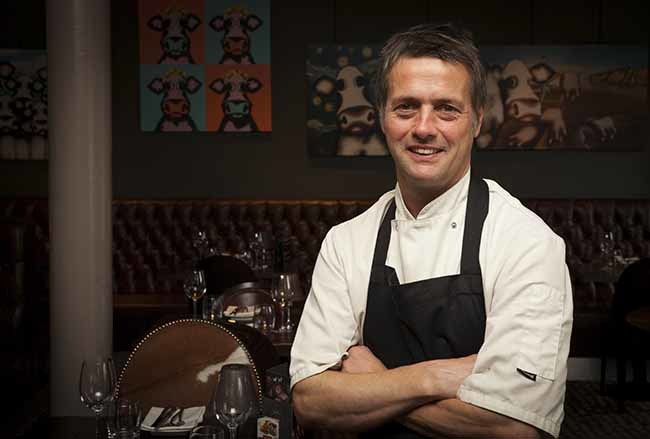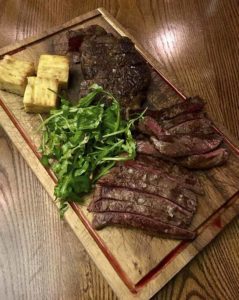
How Kyloe stands apart with 100% Scottish beef
As the competition ramps up among Edinburgh steak restaurants, the team at Kyloe have turned their attention to local produce to stand out from the crowd.
When Kyloe Restaurant & Grill first opened its doors in 2012 in the Rutland Hotel, it was one of the only steakhouses in Edinburgh. Fast-forward five years and restaurants specialising in steak in Scotland’s capital continue to multiply, with Argentinian brand Gaucho having launched just last month on St Andrew Square.
At the start of 2017, Kyloe’s head chef John Rutter and general manager Steven Strachan decided the restaurant had to change things up in order to stand out from the crowd, and the team turned their attention to produce. Sourcing their beef from countries as far afield as Argentina and Australia, they realised they were missing a trick.

Kyloe’s head chef John Rutter
‘Don’t get me wrong, these are great products but they’re being flown thousands of miles, so why use them when you have something amazing on your doorstep?’ says Chef John on the sidelines of a dinner hosted in Kyloe’s private dining room to showcase the restaurant’s locally-procured beef paired with a selection of The Macallan whiskies.
‘We went from wanting to be the best steakhouse in Edinburgh, to being the best steakhouse using Scottish produce in Edinburgh,’ he adds. ‘We believe Scotland has the best beef, the best fish, the best shellfish, and we want to shout about it.’
In March, the restaurant started working with Highland Wagyu, a pedigree beef company breeding 100% full-blood Wagyu, Wagyu crosses, Aberdeen Angus, Beef Shorthorn, Highland and Dexter cattle, which are hand-raised on a 25,000-acre estate farm in Perthshire.

Highland Wagyu sirloin and Hardiesmill bavette
The company, run by husband-and-wife team Mohsin Altajir and Martine Chapman, sells directly to chefs and private customers and is the largest producer of Wagyu cattle in the UK, and on course to being the biggest in Europe.
Hardiesmill is another of the restaurant’s beef suppliers, mainly for textured cuts and items that are a little different, while Malone’s came on board just five months ago, and Chef John has been enjoying experimenting with dry-aging some of its cuts. The restaurant is planning to install dry-aging cabinets at the start of 2018 and John looks forward to doing more using this technique to further differentiate Kyloe’s offer.
The tasting experience consisted of three courses, showcasing the restaurant’s locally-sourced beef paired with The Macallan, which, with its Spey River water, Scottish barley and sherry casks from Spain, shares Kyloe’s focus on provenance and quality.

Scottish charcuterie, featuring Highland Wagyu, Hardiesmill and East Coast Cured
First up was a selection of Scottish charcuterie, featuring Highland Wagyu, Hardiesmill and East Coast Cured, a family charcuterie business based in Leith, specialising in the production of slow cured Scottish pork, beef, venison and poultry.
The dish was paired with The Macallan 12 Year Old Sherry Oak, the classic Macallan that everyone knows and loves. Matured in sherry seasoned European oak casks, the liquid has a heavy mouth feel, a long finish and notes of dark fruits, bitter orange and sultanas, reminiscent of Christmas cake. Its sweetness and subtle spice complemented the saltier flavours of the cured meats well.
For mains was a selection of four types of beef – Highland Wagyu sirloin, Hardiesmill bavette, 40-day whisky-aged rib-eye and 50-day aged beef rib from Malone’s. This went alongside The Macallan Double Cask, which combines whisky aged in American and European sherry seasoned oak casks. A rich whisky with hints of fruity citrus, caramel, spicy ginger and nutmeg, it balanced out the smooth, buttery flavours of the beef.
We finished with a selection of Scottish cheeses paired with The Macallan Rare Cask, a product of sherry bodega casks, some of which are no longer in existence and the majority of which are first fill. A rich and complex whisky with notes of dark honey, dried fruit and ginger, it almost resembles a desert wine or port.

Kyloe’s private dining room ©DN Anderson
For Chef John, working with Scottish suppliers has the added advantage of proximity, meaning he can develop better relationships with his partners – the owners of Highland Wagyu and Teddy Joseph from The Macallan were present at the dinner.
‘We feel it’s important to have a good relationship with suppliers. We need to speak to them and see what’s happening. Food changes so quickly and we’re always trying to find out what’s new and what they’re working on,’ says John.
That said, working with local suppliers doesn’t necessarily make business sense from the outset. Martine of Highland Wagyu admits that her beef is ‘double the price of the Australian Wagyu’.
She comments: ‘It can be tricky for chefs and for ourselves – we want the same thing but it’s difficult to compete on prices… it’s important to us farmers that restaurants like Kyloe support us.’
Despite the price tag, John and the team are convinced that procuring locally is the best way forward and this year have already swapped out six of their suppliers for local partners. They are looking as close to home as possible now, even sourcing fish from Leith rather than Glasgow.
‘I think it’s important, we have such good produce on our doorstep so we’re just trying to push it as far as we can now,’ John says.
TAGS

